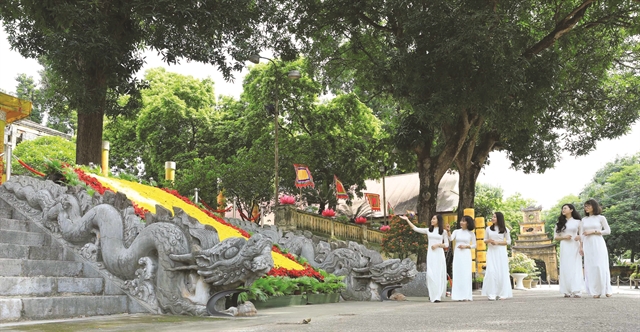The restoration of Kính Thiên Palace, the most significant structure of the Imperial Citadel of Thăng Long, should be accelerated no matter what the cost, according to Associate Professor Nguyễn Quang Ngọc, vice chairman of the Việt Nam Association of Historical Sciences.

The vestige of Kính Thiên Palace in the Imperial Citadel of Thăng Long. Photo vietnamplus.vn
Ngọc is among many scientists who have expressed deep concerns about the restoration of the palace, which has been discussed for many years ago but has still not been carried out.
As the most important building of the Imperial Citadel of Thăng Long, Kính Thiên Palace is the location where the royal family conducted important rituals, received foreign ambassadors and discussed national affairs.
According to Đại Việt Sử Ký Toàn Thư (Complete Annals of Đại Việt), the palace was built in 1428 under the reign of King Lê Thái Tổ (1428-33) and completed in the reign of King Lê Thánh Tông (1442-97).
During the French colonial period, the colonialists demolished the Palace and built an artillery headquarters there. The building was then called the Dragon House as its front and back had the statues of stone dragons.
Presently, the remaining vestige of the ancient palace in the Imperial Citadel of Thăng Long is its base.
According to Ngọc, the restoration has been delayed for a long time and it is unclear when the project will begin.
“I’m worried that we have been indebted to our ancestors too long and we have owed this world heritage too long,” the Associate Professor said.
Chairman of the National Council for National Heritage, Professor Lưu Trần Tiêu agreed, adding: “We cannot fail to restore Kính Thiên Palace. The restoration should be given priority, not only for preservation and research purposes but also for serving the tourists.”
He added that it was important to collect relevant documents, particularly archaeological archives.
No more delays
The Thăng Long-Hà Nội Heritage Conservation Centre has proposed an investment project to restore Kính Thiên Palace on the studies of archaeological records, experience from similar works and opinions of scientists, experts and the community.
The total investment of the project, which will be conducted from 2021-30, is estimated at VNĐ2,000 billion (US$87 million).
According to the centre, the research projects conducted within the Imperial Citadel of Thăng Long since 2010 have achieved a number of results in terms of history and archaeology, which serve as frameworks for the implementation of the next steps.
In phase one from 2021-25, a pre-feasibility study report, a feasibility study report and basic design will be completed. The project will be carried out in phase 2 from 2025-30.
Evaluating the restoration of Kính Thiên Palace as a meaningful project, Mai Phan Dũng, head of the Department of Cultural Diplomacy and UNESCO under the Ministry of Foreign Affairs and secretary-general of the Việt Nam National Commission for UNESCO, has expressed his support for the proposal of the Thăng Long-Hà Nội Heritage Conservation Centre.
He also noted that the project is located at the core of the ancient citadel, which may affect a number of works that are registered as the property of the World Heritage Site.
UNESCO also has a number of regulations for new or restored structures constructed in the heritage area, therefore, the centre should discuss with UNESCO for the best solution in order to minimise the impact on heritage value.
The restoration of Kính Thiên Palance will highlight the typical value of the Imperial Citadel of Thăng Long that was recognised as a UNESCO World Heritage Site in 2010, so it is likely that the project will receive a green light from UNESCO, Dũng said.
The Thăng Long- Hà Nội Heritage Conservation Centre has been assigned to study the model of the restored palace at the appropriate scale to consult scientists, experts and community before consulting concerned institutes and reporting to the Prime Minister.
The investment procedure for the project is expected to be completed this year





